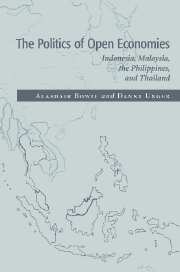3 - Indonesia
Published online by Cambridge University Press: 10 November 2009
Summary
Indonesia is the world's fourth most populous nation, with approximately 190 million inhabitants. Its geographic size – 14,000 islands spread across 3,000 miles with a land area of three-quarters of a million square miles – and extensive natural resources have ensured the continuing attention of foreign powers. More importantly for our purposes, Indonesia's natural bounty affords policymakers a broader palette of potential development strategies (closedness, as well as openness) than in resource-poor and energy-dependent Japan or East Asia.
The Indonesian state is authoritarian in character and its officials suspicious both of private business and of foreigners. In the late 1950s, the first president, Sukarno, ordered the confiscation of assets belonging to citizens of the former colonial power, the Netherlands. The armed forces seized control of former Dutch operations after independence. Leaders of the anticolonial struggle did not want to hand former Dutch firms to those seen as Dutch lackeys, namely the immigrant Chinese. More broadly, the quasi-socialist rhetoric of the Indonesian independence movement supported state management of the nationalized foreign (Dutch) firms. Besides, some of the firms were involved in activities of significance for national security, such as oil production and transportation, suggesting that they should appropriately come under the direction of the armed forces.
This example suggests the broad orientation of state actors to the issues of state/private roles in the economy and the degree to which official economic policy should emphasize openness/closedness.
- Type
- Chapter
- Information
- The Politics of Open EconomiesIndonesia, Malaysia, the Philippines, and Thailand, pp. 44 - 66Publisher: Cambridge University PressPrint publication year: 1997



